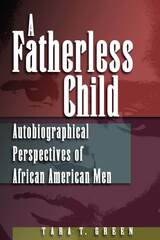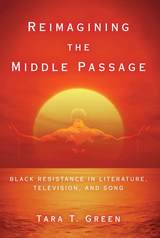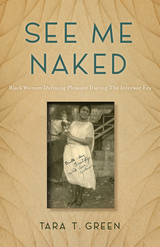3 books by Green, Tara T.

A Fatherless Child
Autobiographical Perspectives of African American Men
Tara T. Green
University of Missouri Press, 2009
The impact of absent fathers on sons in the black community has been a subject for cultural critics and sociologists who often deal in anonymous data. Yet many of those sons have themselves addressed the issue in autobiographical works that form the core of African American literature.
A Fatherless Child examines the impact of fatherlessness on racial and gender identity formation as seen in black men’s autobiographies and in other constructions of black fatherhood in fiction. Through these works, Tara T. Green investigates what comes of abandonment by a father and loss of a role model by probing a son’s understanding of his father’s struggles to define himself and the role of community in forming the son’s quest for self-definition in his father’s absence.
Closely examining four works—Langston Hughes’s The Big Sea, Richard Wright’s Black Boy, Malcolm X’s The Autobiography of Malcolm X, and Barack Obama’s Dreams from My Father—Green portrays the intersecting experiences of generations of black men during the twentieth century both before and after the Civil Rights movement. These four men recall feeling the pressure and responsibility of caring for their mothers, resisting public displays of care, and desiring a loving, noncontentious relationship with their fathers. Feeling vulnerable to forces they may have identified as detrimental to their status as black men, they use autobiography as a tool for healing, a way to confront that vulnerability and to claim a lost power associated with their lost fathers.
Through her analysis, Green emphasizes the role of community as a father-substitute in producing successful black men, the impact of fatherlessness on self-perceptions and relationships with women, and black men’s engagement with healing the pain of abandonment. She also looks at why these four men visited Africa to reclaim a cultural history and identity, showing how each developed a clearer understanding of himself as an American man of African descent.
Through her analysis, Green emphasizes the role of community as a father-substitute in producing successful black men, the impact of fatherlessness on self-perceptions and relationships with women, and black men’s engagement with healing the pain of abandonment. She also looks at why these four men visited Africa to reclaim a cultural history and identity, showing how each developed a clearer understanding of himself as an American man of African descent.
A Fatherless Child conveys important lessons relevant to current debates regarding the status of African American families in the twenty-first century. By showing us four black men of different eras, Green asks readers to consider how much any child can heal from fatherlessness to construct a positive self-image—and shows that, contrary to popular perceptions, fatherlessness need not lead to certain failure.
[more]

Reimagining the Middle Passage
Black Resistance in Literature, Television, and Song
Tara T. Green
The Ohio State University Press, 2018
In Reimagining the Middle Passage: Black Resistance in Literature, Television, and Song, Tara T. Green turns to twentieth- and recent twenty-first-century representations of the Middle Passage created by African-descended artists and writers. Examining how these writers and performers revised and reimagined the Middle Passage in their work, Green argues that they recognized it as a historical and geographical site of trauma as well as a symbol for a place of understanding and change. Their work represents the legacy African captives left for resisting “social death” (the idea that Black life does not matter), but it also highlights strong resistance to that social death (the idea that it does matter).
Exploring the presence of water and its impact on African descendants,Reimagining the Middle Passageoffers fresh analyses of Alex Haley’sRootsand the television adaptations; the history of flooding in Black communities in literature such as Jesmyn Ward’sSalvage the Bonesand Paule Marshall’sPraisesong for the Widow, in blues songs, and in television shows such asTreme; and stories of resistance found in myths associated with Marie Laveau and flying Africans.
Exploring the presence of water and its impact on African descendants,Reimagining the Middle Passageoffers fresh analyses of Alex Haley’sRootsand the television adaptations; the history of flooding in Black communities in literature such as Jesmyn Ward’sSalvage the Bonesand Paule Marshall’sPraisesong for the Widow, in blues songs, and in television shows such asTreme; and stories of resistance found in myths associated with Marie Laveau and flying Africans.
[more]

See Me Naked
Black Women Defining Pleasure in the Interwar Era
Tara T. Green
Rutgers University Press, 2022
Pleasure refers to the freedom to pursue a desire, deliberately sought in order to satisfy the self. Putting pleasure first is liberating. During their extraordinary lives, Lena Horne, Moms Mabley, Yolande DuBois, and Memphis Minnie enjoyed pleasure as they gave pleasure to both those in their lives and to the public at large. They were Black women who, despite their public profiles, whether through Black society or through the world of entertainment, discovered ways to enjoy pleasure.They left home, undertook careers they loved, and did what they wanted, despite perhaps not meeting the standards for respectability in the interwar era. See Me Naked looks at these women as representative of other Black women of the time, who were watched, criticized, and judged by their families, peers, and, in some cases, the government, yet still managed to enjoy themselves. Among the voyeurs of Black women was Langston Hughes, whose novel Not Without Laughter was clearly a work of fiction inspired by women he observed in public and knew personally, including Black clubwomen, blues performers, and his mother. How did these complicated women wrest loose from the voyeurs to define their own sense of themselves? At very young ages, they found and celebrated aspects of themselves. Using examples from these women’s lives, Green explores their challenges and achievements.
[more]
READERS
Browse our collection.
PUBLISHERS
See BiblioVault's publisher services.
STUDENT SERVICES
Files for college accessibility offices.
UChicago Accessibility Resources
home | accessibility | search | about | contact us
BiblioVault ® 2001 - 2024
The University of Chicago Press









